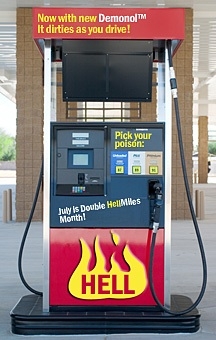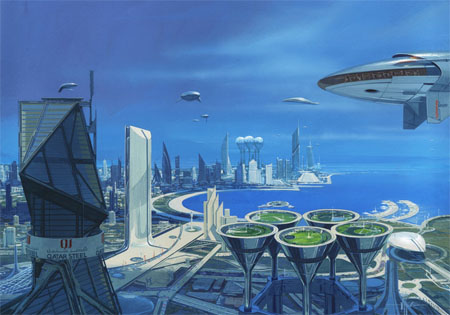It’s Earth Day this coming Thursday. In preparation for a presentation I am giving at a tradeshow this week I recently read Thomas Friedman’s Hot, Flat and Crowded. While Idid not find it quite as interesting as the World is Flat, Friedman does provide a nice synopsis of the challenges facing the planet in the coming century. There were 15 key issues that I noted as key takeaways from Hot, Flat and Crowded. The following list offers a paraphrased summary of the key points in Friedman’s book:
1) Subprime Planet – Most of the world’s industry has been operating under the assumption that we could own the earth and all of its assets with no money down and no interest payments until some time far into the future.
2) Fraudulent GDPs – We have been fooling ourselves with fraudulent accounting by not factoring in what economists would call “externalities.” We have been hiding the true costs of industry by not factoring in the long term health consequences of polluting the air, poisoining the rivers and intensifying global warming.
3) Fuels from Hell – One of the key issues with climate change is that we have focused all of energy resources on “fuels from hell.” Coal, oil and natural gas all come from underground, are exhaustible and emit pollutants. Fuels from heaven such as wind, hydroelectric, biomass and solar power come from above ground, are endlessly renewable and produce no harmful emissions.
4) Demographic Threat – A key CIA official was recently quoted as stating that the agency’s most worrying trend was not terrorism, but demographics. As poor, fragile nations such as Afghanistan, Niger and the Congo grow in population, they will become havens for extremism if basic needs (food, shelter, clothing) cannot be met.
5) Great Drain Robbery – Scarcity of natural resources is driving extreme behaviors. In February 2004, the Chinese drove up the price of scrap metal to record levels. Thieves began to steel iron manhole covers for export to China. Over 150 covers disappeared from Chicago in one month.
6) Cow Belching – As part of a cow’s natural digestive process, the animals chew up their food then spit up a percentage to rechew. Along with the spit comes methane gas. Methane’s heat trapping power is 21x stronger than CO2.
7) Energy Subsidies – Countries such India, China and nations in the Middle East subsidize gasoline, cooking/heating oil and electricity for homes and factories. For example, Indonesia spent 30% of its budget on energy subsidies versus 6% on educations. Subsidies prevent the natural supply and demand patterns to impact energy markets.
8. The Dumbest Machine – Electrical utilities are the dumbest big machine man has ever made. The patchwork of 3200 companies and three regional grids that make up the US electrical grid make the Balkans look unified by comparison. The grid offers no ability to dynamically change price for peak and off-peak utilization nor any intelligent interaction with home appliances.
9) Pet Food outperforms Utilities – in the area of R&D. In most competitive industries, the average R&D investment is 8-10% of annual revenues. Total R&D investment in the US electrical utilities sector was 0.15% of total revenues, which won’t buy more than a Popular Mechanics subscription. Utilities are not investing in clean technologies.
10) Affluenza – More and more countries are suffering from the painful, contagious, socially transmitted condition of affluenza. The symptoms are overload, debt, anxiety and waste resulting from the dogged pursuit of American lifestyles.
12) TILT – The public keeps hoping for a TILT – Terrific Imaginary Low-Carbon Technology. But breakthrough technologies do not enter the market fast enough to have an impact. It typically takes 25 years from commercial introduction for a primary energy form to obtain a 1% share of the global market.
11) Stone Age – The Stone Age did not end, because we ran out of stones. It ended because people invented alternative tools made of bronze and then iron. If oil consuming countries focused their investments on producing renewable energy at scale, the oil age would end with millions of barrels underground.
13) Plug-In Cars – 40% of US electricity generating capacity in the US sits idle or at reduced loads overnight. We could utilize the extra capacity to charge plug-in cars overnight for subsequent day time use. China already has 40M electric scooters which consumers re-charge nightly.
14) Re-generation – Solving the climate crisis will require a “re-generation” in which people of all ages who share a common interest in renewable resources, recycling and other ways of sustaining the earth’s natural environment.
15) Future Cannot Organize – Historically, political reform movements have emerged when the “have-nots” negatively affected by a situation bring their weight to bear in a democratic system. However, the climate crisis pits today’s generation versus its kids and unborn grandchildren.

















One Comment